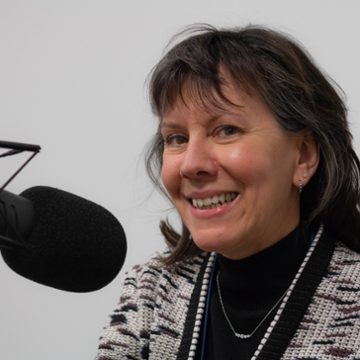Advancing Muscular Dystrophy Research with Elizabeth McNally, MD, PhD

"We're really excited that a therapy like this can be moved into patients and would become something that they might receive, a weekly or a monthly injection of this antibody, to then improve the outcome for their disease."
- Director of the Center for Genetic Medicine
- Elizabeth J. Ward Professor of Genetic Medicine
- Professor of Medicine in the Division of Cardiology
- Professor in Department of Biochemistry and Molecular Genetics
Episode Notes
Elizabeth McNally, MD, PhD, has split time since the onset of the COVID-19 pandemic between her research related to the virus and other research related to genetic medicine and muscular dystrophy. In this episode she details some of the latest advances in muscular dystrophy, including a new therapy being developed in her lab.
Topics covered:
- Gene-specific therapies and exon skipping therapy for children with muscular dystrophy
- How new treatments are increasing the lifespan of patients, allowing them to stay functional longer so that they can have a job and greater life satisfaction
- Findings published in Science Translational Medicine about an antibody developed in McNally's lab that targets the TGF-beta pathway, a pathway known to be important for regulating scarring, or fibrosis (In muscular dystrophy, the muscles become scarred over time, and this antibody helps reduce scarring in the muscles. With this treatment the muscles also became stronger.)
- How to move the findings from animal trials into clinical human trials
- How antibody treatments are being used in other diseases
- The lasting effects of the pandemic on increasing patient access to clinical trials and drug delivery
- Optimization of antisense-mediated exon skipping for Duchenne muscular dystrophy
- Development of therapeutic antibodies for the treatment of diseases
- 2015: RNA Editing Technique Treats Severe Form of Muscular Dystrophy
Subscribe to Feinberg School of Medicine podcasts here:
Continuing Medical Education Credit
Physicians who listen to this podcast may claim continuing medical education credit after listening to an episode of this program.
Target Audience
Academic/Research, Multiple specialties
Learning Objectives
At the conclusion of this activity, participants will be able to:
- Identify the research interests and initiatives of Feinberg faculty.
- Discuss new updates in clinical and translational research.
Accreditation Statement
The Northwestern University Feinberg School of Medicine is accredited by the Accreditation Council for Continuing Medical Education (ACCME) to provide continuing medical education for physicians.
Credit Designation Statement
The Northwestern University Feinberg School of Medicine designates this Enduring Material for a maximum of 0.5 AMA PRA Category 1 Credit(s)™. Physicians should claim only the credit commensurate with the extent of their participation in the activity.
Disclosure Statement
Elizabeth McNally, MD, PhD, receives a consulting fee from Invitae, Cytokinetics, 4D Molecular Therapeutics, Tenaya Therapeutics, Amgen, AstraZeneca, Avidity, Pfizer, Inc., PepGen and Johnson & Johnson, and is the founder of Ikaika Therapeutics. Course director, Robert Rosa, MD, has nothing to disclose. Planning committee member, Erin Spain, has nothing to disclose. Feinberg School of Medicine's CME Leadership and Staff have nothing to disclose: Clara J. Schroedl, MD, Medical Director of CME, Sheryl Corey, Manager of CME, Allison McCollum, Senior Program Coordinator, Katie Daley, Senior Program Coordinator, and Rhea Alexis Banks, Administrative Assistant 2.
CME credit coming soon
